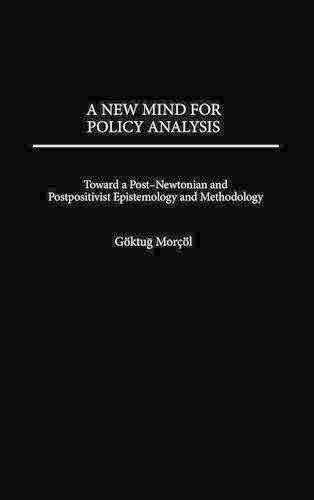
A New Mind for Policy Analysis: Toward a Post-Newtonian and Postpositivist Epistemology and Methodology
(Hardback)
Publishing Details
A New Mind for Policy Analysis: Toward a Post-Newtonian and Postpositivist Epistemology and Methodology
By (Author) Goktug Morcol
Bloomsbury Publishing PLC
Praeger Publishers Inc
30th December 2002
United States
Classifications
General
Non Fiction
320.601
Physical Properties
Hardback
296
Description
Morcol argues that the objectivist and deterministic assumptions of mainstream policy analysis, which are based on the Newtonian/positivist worldview or mind-set, should be transcended. After demonstrating that the favored methods of mainstream policy analysis are based on Newtonian ontological and positivist epistemological assumptions and that the connections between these two are intimately and historically related, he critically assesses and highlights the contributions of quantum mechanics, complexity theory, and cognitive science to a new mind-set in scientific knowledge, a post-Newtonian and postpositivist mind-set. Newtonian/positivist and post-Newtonian/postpositivist worldviews are conceptualized as fuzzy mind-sets, that is they are not mutually exclusive and that they share assumptions at varying degrees. Cognitive science shows that some of the fundamental concepts and assumptions of the Newtonain/positivist philosopysuch as the concept of causality and the tendency to categorize reality (reductionist thinking)are the products of the evolutionary adaptation of the human mind and they have become its built-in defaults. As Morcol suggests, we cannot change the biological defaults of our minds, but we can change our way of thinking, to an extent, through a cultural evolution. He argues that conscious efforts can be made in policy analysis education to help move our thinking toward a post-Newtonian and postpositivist policy analysis. Of particular interest to scholars and advanced students dealing with policy analysis, public administration, and political science, especially those concerned with epistemology and methodology.
Reviews
"Morcol gets behind assumptions acknowledged in standard textbooks to more fundamental ones about reality and our knowledge of it--philosophical assumptions now being reassessed from a variety of theoretical perspectives. Written accessibly while bringing out nuances in meaning, this book provides a valuable bridge from a wide array of abstract theories to courses designed for practitioners."-William H. Newell Professor, School of Interdisciplinary Studies, Miami University, Ohio
"This book invites the reader into the challenging but rewarding worldof postpositivism. Dealing clearly and thoughtfully with its implications for policy theory and practice, the book is an important contribution to this emerging literature."-Frank Fischer Rutgers University
"With an astonishing intellectual breadth that incorporates biology, physics, mathematics, philosophy, and psychology--as well as a deep knowledge of the policy sciences--Morcol proposes a trajectory of changed thinking by which public policy analysis can tanscend the limitations of its positivist and Newtonian origins and become a more open-minded and imaginative enterprise."-Charles T. Goodsell Professor, Virginia Tech
[p]rovide an excellent overview of the assumptions underlying the positivist perspective and its standard criticisms, particularly in the context of the human and policy sciences....[t]hey provide a good start for readers trained in the positivist tradition who want to get the sense of the fundamental flaws in their training...Morcol is very good at summarizing problems with the common practice of policy research and introducing quantum mechanics and sciences of complexity to the uninitiated reader.-Journal of Church and State
"provide an excellent overview of the assumptions underlying the positivist perspective and its standard criticisms, particularly in the context of the human and policy sciences....they provide a good start for readers trained in the positivist tradition who want to get the sense of the fundamental flaws in their training...Morcol is very good at summarizing problems with the common practice of policy research and introducing quantum mechanics and sciences of complexity to the uninitiated reader."-Journal of Church and State
"[p]rovide an excellent overview of the assumptions underlying the positivist perspective and its standard criticisms, particularly in the context of the human and policy sciences....[t]hey provide a good start for readers trained in the positivist tradition who want to get the sense of the fundamental flaws in their training...Morcol is very good at summarizing problems with the common practice of policy research and introducing quantum mechanics and sciences of complexity to the uninitiated reader."-Journal of Church and State
Author Bio
GKTUG MORCL is Associate Professor of Public Administration and Policy at the Department of Political Science and International Affairs at Kennesaw State University. His most recent publications include New Sciences for Public Administration and Policy (co-edited, 2000).
